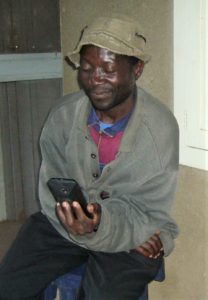Just over twenty years ago I went to Kenya to live in a rural village. I stayed with an American family involved in Bible translation, in order to help homeschool their children.

Katherine in Kenya
I was 18 years old when I went to Kenya. At that time we did not have a laptop or mobile phone in my parents’ home, though we did have a desktop computer and I had an email account and, of course, we had a landline. In Kenya I was to find that landlines barely existed, and my primary form of communication was to be letters that took many days to get back to England. I seem to recall there was the possibility of writing an email, saving it on a disk, and then sending that to someone in town if there was a more urgent communication, but I don’t think we resorted to that very often.
Later my host family got mobile phones; I remember that one had a pink cover and the other a blue, so that we could tell them apart! I don’t remember when they got them, whether it was the year I homeschooled or a couple of years later when I returned for a visit. Either way, it seemed like huge progress – they had mobile phones there before I even had one in England!
We are now using WhatsApp, Facebook and Scripture apps to encourage engagement with God’s word

Listening to Scripture in the Safwa language on a mobile phone (photo by Katherine O’Donnell)
Now I live and work in Tanzania, or at least, I usually do. Due to the global health crisis I have been relocated to my passport country and am once again living in my parents’ home. Who would have imagined twenty years ago that today I would be meeting with my Tanzanian colleagues via Zoom, seeing their faces and hearing their voices with barely a second of delay, each of them using a laptop in their home and their smart phone as mobile hotspots, while I sit at my parents’ home with my laptop connected to their wireless broadband. Or who would have imagined that while enjoying a meal with friends at our favourite café in Mbeya (where I usually live), I could take a photo and send it to my family WhatsApp group and get an instant smiley face from my parents! Technology has transformed not only communication, but also the way we work. As a Scripture Engagement worker in a Bible translation project working with over ten languages, we are now using WhatsApp, Facebook and Scripture apps to encourage engagement with God’s word in local languages. We share Jesus Film video clips, memes, talking books and pictures via social media platforms, connecting with members of language communities both near and far. Digital media and mobile phone technology really have opened up a whole new way to facilitate engagement with God’s word, including in countries like Kenya and Tanzania.
Technology has come on in leaps and bounds, but many still cannot access it

Struggling to get phone signal (photo by Frank Mwaluanda)
But that’s far from being the whole picture. What about when my colleague went to a village to do a workshop, and the only way to get network coverage for his mobile phone was to climb a tree? Or when I went somewhere to teach and the only way to charge my phone was to leave it at a small shop with a solar panel that offered a phone-charging service for a small fee? Then there’s the mission partners currently working with a language group that we have started translation work in – the only time we can have good communication is when they leave their home in the village, with its very poor mobile network, and head to a town several hours away by boat. Or there’s the person who hears the audio Scriptures in their language, and excitedly you offer to send the audio files to their phone via bluetooth, only to find that their phone has such small memory capacity that they only have space for one chapter of Mark’s gospel. And there’s the new smart phones you buy for your colleagues to facilitate digital Scripture engagement possibilities and better communication, but within twelve months their batteries have almost died because of the poor quality of available technology. And, of course, there are many who still don’t have a phone at all.
My job can involve virtual video meetings one week and teaching in a rural Bible college with no electricity or mobile phone network another

A Kinga husband and wife listen to Scripture on an audio device (photo by Riwa Sambwe)
Technology may have come on in leaps and bounds, but there remain many who cannot access it. It’s exciting to be able to share written, audio and visual Scripture via social media, but we can’t depend on these methods. In rural villages and even in urban environments in Tanzania (and many other African countries), printed Scripture, solar powered audio devices and face-to-face encounters are still at the heart of helping people engage with God’s word in their languages. We live in an age of huge disparity between those who have and those who don’t. My job can involve virtual video meetings one week and teaching in a rural Bible college with no electricity or mobile phone network another. We thank God for any and every opportunity to help people connect with him and pray for wisdom as we engage with communities at every level, through every possible means. May God continue to open doors for his word to go out, whether through Facebook or a phone call, through WhatsApp or a face-to-face meeting. Technology may be ever advancing, but it is far from reaching every corner. Many challenges remain in distributing God’s word and helping people engage with it. Please pray with us.
Katherine works in Tanzania in Scripture Engagement, helping people to access God’s word, and then to read it, listen to it, understand it, apply it to their own lives and be changed by it.
« Story Sticks Fairness and Equality, from God’s Kingdom Perspe...»









